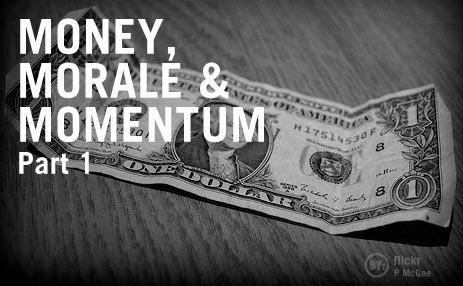Latest
-
Objections to the Christian Faith from the Unchurched and De-Churched
 Tue Dec 02, 2014
Tue Dec 02, 2014
by Resurgence -
Craig Groeschel: We Innovate for Jesus
 Tue Oct 14, 2014
Tue Oct 14, 2014
by Resurgence -
Mark Driscoll: Revelation
 Tue Oct 07, 2014
Tue Oct 07, 2014
by Resurgence -
RESURGENCE LEADERSHIP #034: JOHN PIPER, WHY I TRUST THE SCRIPTURES, PART 2
 Tue Sep 30, 2014
Tue Sep 30, 2014
by Resurgence -
Resurgence Leadership #033: John Piper, Why I Trust the Scriptures, Part 1
 Tue Sep 23, 2014
Tue Sep 23, 2014
by Resurgence

Archives
Money, Morale, and Momentum, Part 1

Some months ago my friends at Leadership Network invited Larry Osborne, Greg Surratt, and myself to meet with young pastors of growing, larger churches over the course of a few days in one of LN’s numerous learning communities. It was a great time, and even though I was supposed to be a mentor pastor, the truth is I learned far more than I taught, as is usually the case in situations like these. Much of our formal and informal discussion time centered on the economy and the rough water facing churches economically.
Cut Budgets
At Mars Hill in Seattle we have pared our budget back and had a round of layoffs at the end of 2008. Still, we did finish the year above budget, beat the previous year’s giving by a healthy margin, and are floating by God’s grace and our people’s generosity. I heard amazing reports at the conference from parts of the country (such as Nevada and Arizona) that have been far more seriously hit.
I scratched out a few notes in my Moleskine along the way and shared them with our Executive Elders. I am now passing these practical points on in case they can be of help to other church and ministry leaders. The big idea is how to keep morale up when money is down so that gospel momentum can be maintained. Just because money is down does not mean that our vision should be down. People need Jesus, and many need practical help from Jesus’ people.
Some Scriptures to Guide Financial Decision-Making
The book of Proverbs, on two occasions, says, “The prudent sees danger and hides himself, but the simple go on and suffer for it” (Prov. 22:3; 27:12). Since there is no one of merit indicating that the financial mess we are in will be resolved anytime soon, it is foolish for ministry leaders to not see the dangers that are potentially lurking ahead and make adjustments as necessary. Simply, this is no time for foolish naivete and goofy “Trust the Lord” talk when wise stewardship is not in place.
In the New Testament, Paul says the following: “Now there is great gain in godliness with contentment, for we brought nothing into the world, and we cannot take anything out of the world. But if we have food and clothing, with these we will be content. But those who desire to be rich fall into temptation, into a snare, into many senseless and harmful desires that plunge people into ruin and destruction. For the love of money is a root of all kinds of evils. It is through this craving that some have wandered away from the faith and pierced themselves with many pangs” (1 Tim. 6:6–10).
Covetousness or Contentedness?
Indeed, much of the mess people are in with their personal finances is the result of covetousness instead of contentedness. Additionally, since the god of money has died and shows no sign of a sudden resurrection, it is a wonderful time to call people to live within their means and worship Jesus rather than trying to use him to give them their idols of status, possession, and security. Furthermore, it is a good time to warn our people against such things as foolish investing and even gambling, because when times are hard, rather than living within their means, some are prone to risk everything out of a sinful love for money.
What About the Rich?
Paul continues by saying that there are always people who are doing well financially, even when times are tough: “As for the rich in this present age, charge them not to be haughty, nor to set their hopes on the uncertainty of riches, but on God, who richly provides us with everything to enjoy. They are to do good, to be rich in good works, to be generous and ready to share, thus storing up treasure for themselves as a good foundation for the future, so that they may take hold of that which is truly life” (1 Tim. 6:17–19).
This fact is commonly overlooked, but indeed, not everyone is dying financially. There are people, albeit a few, who are flourishing. For example, those in certain medical and educational fields are still working in growing fields, and they may not be enduring the kind of financial strain that the majority are. Still other people are rich, with plenty of margin to spare. We should remind our own people who find themselves doing well financially of Paul’s timely words to the rich.
Continued here.